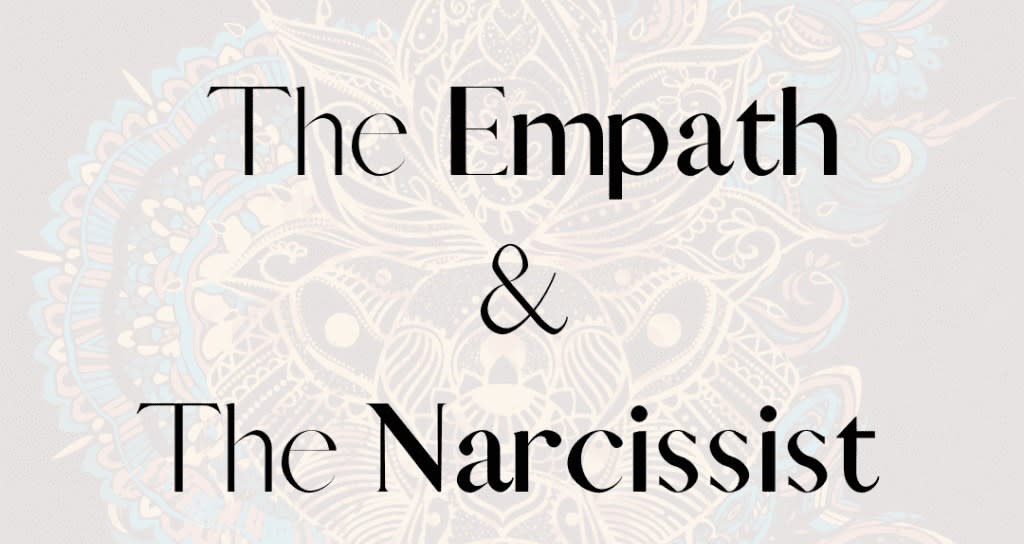When Empaths and Narcissists Collide: The Fire and Ice of Toxic Friendships
Vocal Authenticity

In the intricate tapestry of human relationships, there exists a unique and often volatile bond between empaths and narcissists. Empaths, with their selfless and giving nature, are drawn to the magnetic charm of narcissists, who exude confidence and allure. However, beneath the surface lies a tumultuous dynamic that can result in toxic friendships. This article explores the complexities of such relationships and the inherent clash between fire and ice.
When empaths and narcissists collide, it's as though two opposing forces are brought together. Empaths, characterized by their deep empathy and ability to feel and understand the emotions of others, approach friendships with warmth and compassion. On the other hand, narcissists are self-centered individuals who crave attention and admiration, often exploiting others for their own gain.
These contrasting personalities create a dynamic that is both intriguing and destructive. The empath's selflessness may initially attract the narcissist, who basks in the admiration and adoration received. However, as the relationship progresses, the empath struggles to establish and maintain healthy boundaries, often finding themselves stuck in a cycle of overgiving and neglecting their own needs.
In this article, we delve into the challenges faced by empaths and explore the manipulative tactics employed by narcissists. By uncovering the intricacies of these toxic friendships, we aim to shed light on the fire and ice clash that can leave lasting emotional scars.
The Empath's Selflessness and the Narcissist's Self-Centeredness
Empaths possess an innate ability to tune into the emotions of others and offer support and understanding. They are driven by a genuine desire to help those around them. Empaths are empathetic individuals who often put the needs of others before their own. This selflessness is a core characteristic of an empath, as they genuinely care about the well-being of those in their lives.
On the other hand, narcissists are characterized by their self-centeredness and manipulative tendencies. They have an insatiable need for attention and validation, often at the expense of others. Narcissists frequently exploit the empath's compassionate nature for their own personal gain. They may manipulate or emotionally manipulate empaths to control or dominate the relationship.
When these two personalities collide in a friendship, it can create a combustible dynamic. The empath's selflessness can be taken advantage of by the narcissist's self-centeredness. The empath may find themselves constantly giving, while the narcissist is always taking. This stark contrast in personalities can lead to a toxic and imbalanced friendship, where the empath feels drained and the narcissist feels empowered.
Understanding the fundamental differences in the empath's selflessness and the narcissist's self-centeredness is crucial in recognizing and navigating this challenging dynamic. It is important for empaths to establish healthy boundaries and protect themselves from being exploited, while the narcissist needs to develop empathy and consider the emotions and needs of others.
Struggling to Set Boundaries: The Empath's Predicament
Empaths often find themselves in a predicament when it comes to setting boundaries with their narcissistic friends. Their compassionate nature drives them to prioritize the needs of others above their own, even if it means sacrificing their emotional well-being. This lack of boundaries can lead to emotional exhaustion for the empath, as they constantly cater to the whims of their narcissistic companion.
The empath's struggle to set boundaries stems from their deep empathy and desire to please others. They have an innate ability to understand and feel the emotions of those around them, which can make it difficult for them to say no or assert their own needs. This leaves them vulnerable to being taken advantage of by narcissistic friends who exploit their selflessness.
In toxic friendships, the empath may find themselves constantly giving and receiving very little in return. They may feel obligated to meet the narcissist's demands, even if it means neglecting their own well-being. This one-sided dynamic can leave the empath feeling drained and unappreciated.
It is crucial for empaths to recognize the importance of setting boundaries in order to protect their own emotional health. By learning to prioritize their own needs and assert their limits, they can create healthier and more balanced relationships. However, breaking free from the empath's natural inclination to please others can be a challenging journey.
The One-Sided Relationship: Pleasing the Narcissistic Friend
In friendships between empaths and narcissists, a common pattern emerges - the empath is determined to please their narcissistic friend. The empath's desire to maintain harmony often results in a one-sided relationship, where the narcissist becomes the center of attention. This dynamic causes the empath's own needs and desires to be disregarded, making the friendship inherently imbalanced.
The empath's selflessness and empathetic nature make them prone to putting others' needs before their own. They are skilled at understanding and meeting the emotional needs of those around them. However, when paired with a narcissistic friend, this selflessness can be taken advantage of. The narcissist thrives on attention and admiration, and the empath's willingness to please becomes a perfect match for their self-centeredness.
As a result, the empath finds themselves constantly catering to the narcissist's demands, while their own needs and desires take a backseat. They may find themselves constantly seeking validation and approval from the narcissistic friend, going to great lengths to ensure their happiness. This one-sided dynamic can leave the empath feeling drained, unfulfilled, and emotionally neglected.
It is important for empaths to recognize the imbalance in these relationships and set boundaries to protect their own well-being. By prioritizing their own needs and asserting themselves, empaths can begin to regain control and establish healthier friendships.
Threats to Emotional Depth: The Narcissist's Response
When it comes to the deep emotional capacity of empaths, narcissists often perceive it as a threat. The empath's ability to connect on a profound level and understand the emotions of others can be intimidating to the narcissist. In an attempt to maintain control and assert their dominance, narcissists may resort to controlling or belittling the empath.
This manipulation serves to diminish the empath's self-worth and leaves them feeling emotionally drained and depleted. The narcissist's response is rooted in their need for power and admiration, and they view the empath's emotional depth as a challenge to their superiority. By undermining the empath's emotions and dismissing their feelings, the narcissist can maintain their sense of control.
This toxic dynamic erodes the empath's confidence and sense of self, as they are constantly made to feel inadequate. The narcissist's response not only stifles the empath's emotional expression but also prevents them from forming deep and meaningful connections. It is a destructive cycle that perpetuates the power imbalance and hinders the empath's personal growth and well-being.
Gaslighting and the Empath's Sense of Reality
Narcissists often employ gaslighting tactics to make the empath believe that they are the source of the problems within the friendship. Gaslighting is a manipulative behavior that erodes the empath's sense of reality, causing them to question their perceptions and experiences. The narcissist may twist the truth, deny their actions, or even blame the empath for things they didn't do. This constant manipulation can leave the empath feeling confused, doubting themselves, and blaming themselves for the toxicity of the friendship.
Gaslighting can be incredibly damaging to the empath's mental and emotional well-being. It chips away at their self-confidence and makes them question their own judgment. The empath may start to believe that they are the problem, that they are overly sensitive or too emotional. This self-blame further solidifies the toxic nature of the friendship, as the empath becomes trapped in a cycle of self-doubt and self-criticism.
It is important for empaths to recognize these gaslighting tactics and understand that they are not at fault. By acknowledging the manipulative behavior, the empath can begin to regain their sense of reality and break free from the toxic friendship.
The Struggle to Break Free: The Empath's Empathy Trap
Empaths, with their innate ability to feel and understand the emotions of others, often find it incredibly difficult to break free from toxic friendships with narcissists. Their deep-rooted desire to help and fix relationships can become a trap, keeping them entangled in a cycle of emotional turmoil.
The empath's empathy trap lies in their unwavering commitment to prioritize the needs of others over their own well-being. They believe that with enough love, understanding, and support, they can heal the narcissist and restore the friendship to its former glory. This selfless nature makes it challenging for empaths to recognize when they are being taken advantage of or manipulated.
Breaking free from the toxicity requires immense strength and self-awareness. Empaths must learn to set boundaries and prioritize their own mental and emotional health. It involves acknowledging that they cannot fix someone who does not want to be fixed and accepting that their efforts may be in vain. It is a painful process that requires letting go of the hope that things will change and finding the courage to put themselves first.
In order to break free from the empathy trap, empaths must surround themselves with a support system that understands their struggles and encourages their growth. They need to learn to say no, to distance themselves from toxic individuals, and to focus on their own well-being. It is only through this journey of self-discovery and self-care that empaths can truly break free from the clutches of toxic friendships with narcissists.
Maintaining Control: The Narcissist's Manipulative Tactics
Narcissists, unwilling to relinquish control and power, engage in manipulative behaviors to maintain their hold over the empath. They exploit the empath's empathetic nature, exploiting their vulnerabilities and using guilt and manipulation as tools of control.
One common tactic used by narcissists is gaslighting, where they manipulate the empath's sense of reality. They twist the truth, deny their own actions, and make the empath doubt their own perceptions. This leaves the empath feeling confused, disoriented, and dependent on the narcissist for validation.
Another manipulative tactic employed by narcissists is emotional blackmail. They use guilt as a weapon, making the empath feel responsible for their unhappiness or failures. By playing on the empath's compassionate nature, the narcissist can manipulate them into doing what they want, ensuring their control remains intact.
Recognizing these tactics is crucial for the empath to reclaim their autonomy and break free from the toxic grip of the narcissistic friend. By understanding the manipulative tactics used by narcissists, the empath can begin to set boundaries, protect their emotional well-being, and ultimately regain control over their own life.
In Conclusion
The collision between empaths and narcissists in friendships embodies the fire and ice of toxic relationships. The selflessness of the empath clashes with the self-centeredness of the narcissist, resulting in emotional exhaustion and imbalance. It's a recipe for disaster, leaving the empath feeling drained and the narcissist craving constant validation.
To break free from this toxicity, empaths must learn to set boundaries, recognize manipulation, and prioritize self-care. It's not an easy task, but it's essential for their well-being. By understanding the dynamics at play, individuals can navigate these treacherous waters with greater awareness.
In the end, it's crucial for empaths to remember that they deserve healthy and balanced relationships. They don't have to sacrifice their own happiness for the sake of others. By taking control of their own lives and prioritizing their own needs, empaths can protect themselves from the emotional turmoil caused by toxic friendships.
So, if you find yourself in a toxic friendship with a narcissist, remember that you have the power to break free. Surround yourself with people who appreciate and respect your empathetic nature. You deserve nothing less.
About the Creator
Tammy Reese
Tammy is best known for her legendary interviews with Sharon Stone, Angela Bassett, Sigourney Weaver, Geena Davis, Morris Chestnut, Jeffrey Dean Morgan, Sheryl Lee Ralph, Laurence Fishburne, Omar Epps, Joseph Sikora, and more.






Comments
There are no comments for this story
Be the first to respond and start the conversation.